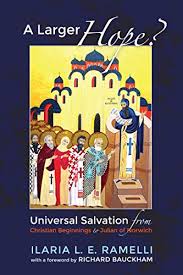Ilaria Ramelli in A Larger Hope?, Volume 1: Universal Salvation from Christian Beginnings to Julian of Norwich shows that universal salvation was taught by numerous Fathers of the church, including those recognized as saints and that the origin was not in pagan philosophy or Gnosticism but in reflections upon Scripture.
I cannot judge the scholarly evidence, but she seems to make her case.
What puzzles me is the hostility to the possibility of universal salvation. Origen and others thought it should be taught only to the mature, and Douglas Farrow holds this against them. Many feared that the doctrine could lead to moral laxity; but that does not mean it is false. As Paul discovered, his preaching of freedom from the Law could and did lead to moral laxity. The misunderstanding of a doctrine and its misuse does not call the truth or orthodoxy of the doctrine into question.
I certainly hope there will be universal salvation and it seems to follow the logic of Scripture. I have just finished reading Richard Alter’s translation of the prophets, and the constant theme is that the Lord is angry a little while, but His mercy endures forever.
As some have noticed, the doctrine of universal salvation is in part motivated by a desire to provide a theodicy, but it only moves the question back to the evils and sorrows of time. Even if all will be well, all is not well in this world. It is very not well, sometimes it is a horror.
I have wondered why God did not avoid all this suffering by creating all rational creatures free from death and with the perfect beatific vision. They would see God as He is, the Absolute Good; therefore, their wills would freely and permanently be moved to love Him.
What would be missing if God had avoided the slaughterhouse of history, with the suffering and torments of animals and humans?
I am looking at it above my computer: the Cross. Without a world in which the nothingness of evil gnawed at the goodness of creation, the Son of God would never have become incarnate, died for us, and rose again, unleashing the power of his resurrection through the gift of the Holy Spirit. Or as the Exultet proclaims: o felix culpa, o happy fault, o truly necessary sin of Adam, that led to such and so great a Redeemer.
Does this justify the ways of God with man? That God Himself has shared in our sufferings? Ratzinger once said that all theodicies sound hollow to a person in anguish, that the only theodicy is the cross. What did God wish to accomplish that could be accomplished only through the suffering of his creatures, whom he loved, and of his own Son. Perhaps we will not know that until the end beyond the end, when Christ turns over the kingdom to his Father.
